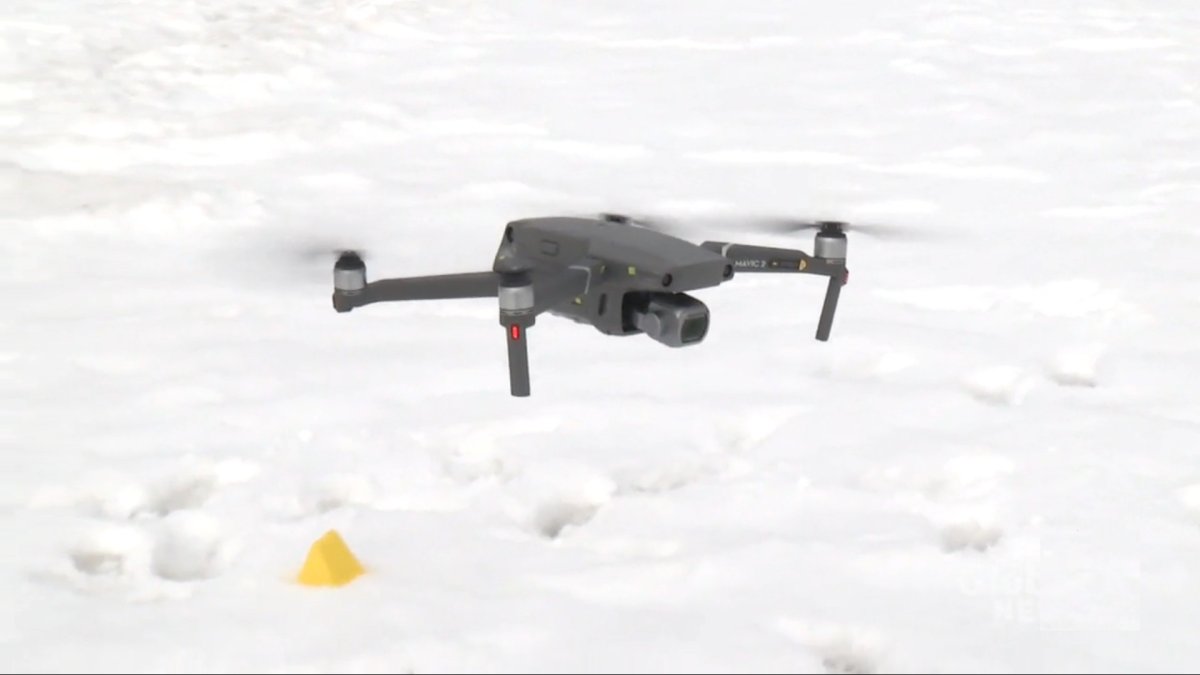Hamilton police (HPS) expects it will be expanding its drone program in the near future following several successful deployments during the first two and a half years of operation.

Community Safety Division officer and licensed drone operator Sgt. Fabrizio Giuliani says the intention is not necessarily to put more drones in the air but to seek enhancements to better support search and rescue, collision reconstruction operations as well as monitoring “large scale events.”
“We need better ones and those will enhance our program,” Giuliani explained.
“So it’s not like we are looking to immediately to purchase any more, we’re just looking to enhance the program that we’ve already got going on.”
Since starting a program in 2021, Hamilton police have deployed their Remotely Piloted Aircraft Systems (RPAS) 59 times over the city.
The bulk of the flights, 24, were tied to collision reconstruction investigations with some aircraft borrowed from Hamilton Fire and Mohawk College‘s Unmanned and Remote Sensing Innovation Centre (URSIC).
Twelve times the crafts were deployed for general investigations and ten times in search and rescue operations, which included two separate deployments using drones in seeking a 66-year-old man and 80-year-old missing in late 2022.
Giuliani says the service trains operators through Mohawk‘s URSIC, which also makes recommendations on what types of unmanned units the service should acquire.
The highly touted Mohawk program is already working with Transport Canada on testing initiatives and providing structure inspections for the 407 ETR.

Get daily National news
HPS’ drone program is not a full-time initiative having just 11 part-time pilots, utilizing officers that have other assignments within the service.
During an update on the program at the police service board meeting Thursday, HPS’ executives told stakeholders courts are recognizing the tech as “best evidence” as it improves.
With that, they added it’s anticipated the service will use it “more frequently” as time goes by.
Downtown councillor Cameron Kroetsch said he didn’t support the usage of the technology in some circumstances, particularly at large events.
The Ward 2 politician, who says he’s been under police surveillance in the past, suggested drone activity is “a very unsettling experience ” and not something the public is “prepared for.”
“People see drones overhead (and) they don’t necessarily know what’s going on with that,” Kroetsch remarked.
“There isn’t necessarily notice given to people that there’s going to be drone surveillance. People aren’t sure what their rights are with respect to drone surveillance.”

Central Mountain (Ward 7) councillor Esther Pauls says she’s received some queries from constituents about seeing police drones in the air but supports usage in some circumstances as a matter of public safety.
“As long as the public is made aware of it, I think they will understand how important this tool is for the police to have,” said Pauls.
HPS’ RPAS program follows similar protocols seen with other established schemes from 10 Ontario police services including Niagara, Halton, Peel, Toronto and the OPP.
One of the HPS units is equipped with FLIR – forward-looking infrared – which is applied to search and rescue operations using heat signature technology giving eyes to operators during periods of inclement weather or darkness.
All flights are audited by Giuliani and an inspector prior to takeoff and are primarily used for search and rescue, collision reconstruction and monitoring large events – including the Grey Cup, NHL classic or McMaster homecoming.
Giuliani insists the HPS strategy is “very strict” and based on guidelines from the Office of the Information and Privacy Commissioner of Ontario (IPC) and Canada’s privacy commissioner as laid out in a Privacy Impact Assessment (PIA) recently conducted by the service.
He says the drones are not being used for random surveillance since the service would need judicial authorization for such a measure.
“For us, it would be a scheduled event, or even if it’s a not schedule event, (like) a pop-up event in order to provide us information about that event,” Giuliani said.
“We are not putting them up for the sake of putting them up.”
Global News reached out to the IPC seeking the agency’s reaction to HPS’ program and others now incorporated into several Ontario police services.
The IPC said they “strongly encourage” organizations governed by Ontario’s privacy laws, including police services, to conduct PIAs to identify and reduce potential privacy risks.
“PIAs should address the necessity of the program and the safeguards and controls required for a justified and proportionate program,” the statement read.
Limiting use for lawful purposes, identifying stakeholders in a program and controls on what information is collected, used, retained, and disclosed were also suggested guidelines by the IPC.












Comments